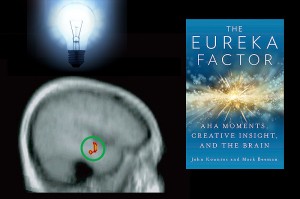
In the third century B.C., Archimedes was stepping into a bath when he suddenly conceptualized a way to distinguish between metals by the volume of water displacement they produced when placed in a full container. He supposedly ran naked out from the baths and into the streets of Syracuse exclaiming “Eureka!”
On April 14, John Kounios, a professor of psychology and director of the doctoral program in Applied and Cognitive Brain Sciences at Drexel University, and his co-author, Mark Beeman of Northwestern University, will be releasing their book that focuses on this type of sudden insight. It is named “The Eureka Factor: Aha Moments, Creative Insight, and the Brain,” shedding insight on how and why sudden creative moments like Archimedes’ hapen and how readers can hope to instigate more moments of insight for themselves.
“In that moment you take these bits and pieces — these elements of thought — and you recombine them in a way that is not obvious to come up with something that is potentially useful,” Kounios explained.
The pair has been collaborating on this field of research since they met working at the University of Pennsylvania in the late ‘90s. They decided to focus on the science of creativity because it was open game for them as an interesting topic on which little research had been done.
“I realized that creativity was a topic that there was widespread interest in but little to no research in the way of neuroimaging. Nothing was known about brain mechanisms underlying creativity and problem-solving,” Kounios said.
Kounios and Beeman’s research on the origin of “aha moments” in 2004 received much notoriety, finding that instants of sudden insight often show more activity in the brain’s right hemisphere compared to more analytical problem-solving processes.
This book illustrates the forefront of neurological research about creativity and insight. The work focuses around the idea that humans often come up with solutions or have sudden insights without their own conscious awareness and how one can become more aware of the factors that lead up to these insights.
“There are certain ways you could intervene to make an insight more likely. There are things you can change about the environment, about what you do, what you think that make it more likely that the end result will be an insight,” Kounios said.
The book explains factors associated with creativity. Kounios and Beeman’s research led them to believe that getting enough sleep, having a positive mood, being motivated and creating a good working environment can help to inspire more “aha” moments.
“When people are in a good mood they’re more likely to solve a problem with a flash of insight, compared to when they’re in a bad mood — specifically when they’re anxious. When you’re anxious you’re more likely to be analytical and methodical and deliberate in your thinking,” Kounios explained.
“When you’re in a positive mood that expands the range of ideas that you’re willing to consider. When you’re anxious you get ‘mental tunnel vision.’ You only focus on the dominant aspects of the situation,” he continued.
Focusing on these dominant aspects can limit one in terms of thinking innovatively and having flashes of insight. When one is in a positive mood they are more likely to harness inventive and original ideas.
“It’s like taking the blinders off. You’re willing to consider long-shot ideas that are often what you get when you have this sudden insight,” Kounios said.
The book contains more information on the process of creativity and historical anecdotes on the science behind moments of creative insight. To guarantee a copy, pre-order the book here.

